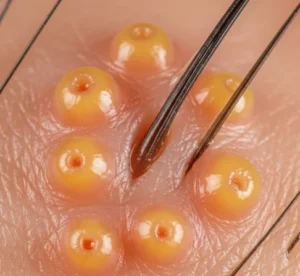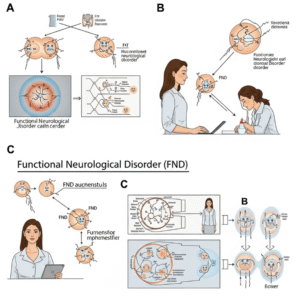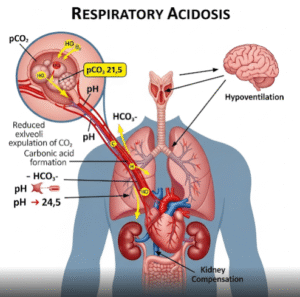Overview
Loss of taste and smell, medically known as anosmia (loss of smell) and ageusia (loss of taste), refers to a partial or complete inability to detect odors and flavors. These senses are essential for enjoying food, detecting hazards, and maintaining overall quality of life.
In Korea, hospitals and ENT (Ear, Nose, and Throat) clinics provide advanced diagnostic tools, including nasal endoscopy, olfactory testing, and imaging studies, to determine the cause of taste and smell loss. Prompt evaluation is important to address underlying conditions, improve sensory function, and prevent nutritional or safety issues.
Key Facts
- ➔ Loss of taste and smell can be temporary or permanent, depending on the cause.
- ➔ Common causes include viral infections, sinus diseases, head trauma, neurological disorders, and aging.
- ➔ These senses play a crucial role in appetite, nutrition, and detecting dangers like smoke or spoiled food.
- ➔ COVID-19 has highlighted how viral infections can cause sudden loss of taste and smell.
- ➔ Early recognition and treatment can restore sensory function and prevent complications.
What is Loss of Taste and Smell?
Loss of taste and smell involves the partial or complete impairment of chemosensory perception:
- ➔ Anosmia: Complete inability to detect odors.
- ➔ Hyposmia: Partial reduction in smell.
- ➔ Ageusia: Complete loss of taste.
- ➔ Hypogeusia: Partial reduction in taste.
- ➔ Clinical importance: Impaired taste or smell can affect appetite, food intake, and safety, especially in detecting spoiled food, smoke, or gas leaks.
The condition can occur suddenly or gradually, and its severity can range from mild distortion to complete sensory loss.
What Symptoms Are Related To
Loss of taste and smell may be accompanied by other symptoms depending on the cause:
- ➔ Nasal congestion or runny nose
- ➔ Sinus pain or pressure
- ➔ Headache or facial pain
- ➔ Fever or sore throat if caused by infections
- ➔ Fatigue or malaise
- ➔ Altered food perception, weight loss, or decreased appetite
- ➔ Changes in mood, irritability, or reduced quality of life
Identifying these associated symptoms helps clinicians determine whether the loss is due to a benign or serious condition.
What Causes / Possible Causes
Loss of taste and smell can result from multiple factors:
- ➔ Viral infections: Common cold, flu, or COVID-19.
- ➔ Sinus and nasal conditions: Chronic sinusitis, nasal polyps, or allergic rhinitis.
- ➔ Neurological disorders: Parkinson’s disease, Alzheimer’s disease, or multiple sclerosis.
- ➔ Head trauma: Injury affecting olfactory nerves or brain regions controlling smell and taste.
- ➔ Medications: Antibiotics, antihypertensives, or chemotherapy drugs.
- ➔ Aging: Gradual sensory decline with age.
- ➔ Nutritional deficiencies: Zinc or vitamin B12 deficiencies affecting taste perception.
Correct identification of the cause is critical to restore sensory function and improve nutrition.
When Should I See My Doctor
Medical evaluation is recommended if loss of taste and smell is:
- ➔ Sudden and unexplained
- ➔ Persistent for more than two weeks
- ➔ Accompanied by nasal obstruction, facial pain, or chronic sinus issues
- ➔ Associated with neurological symptoms like weakness, numbness, or confusion
- ➔ Causing malnutrition, weight loss, or safety concerns
Early consultation with an ENT specialist or neurologist can identify the underlying cause and guide effective treatment.
Care and Treatment
Treatment depends on the underlying cause of the sensory loss:
- ➔ Viral infections: Most resolve spontaneously; supportive care and olfactory training can help.
- ➔ Sinus or nasal conditions: Medications such as corticosteroids, nasal irrigation, or surgical removal of polyps.
- ➔ Neurological causes: Disease-specific management for Parkinson’s, Alzheimer’s, or multiple sclerosis.
- ➔ Head trauma: Rehabilitation, olfactory training, or surgical intervention if structural damage exists.
- ➔ Medication-induced loss: Adjusting or substituting medications under medical supervision.
- ➔ Nutritional support: Zinc or vitamin supplementation if deficiencies are detected.
- ➔ Sensory training: Olfactory exercises to stimulate nerve recovery and improve smell perception.
Most cases improve with targeted treatment and supportive care, though recovery may take weeks to months depending on the cause.
Treatment Options in Korea
Korean hospitals provide comprehensive care for loss of taste and smell:
- ➔ ENT evaluations: Nasal endoscopy, imaging, and olfactory testing for precise diagnosis.
- ➔ Neurological assessment: MRI or CT scans to detect brain or nerve abnormalities.
- ➔ Medical therapy: Corticosteroids, antibiotics, or medications addressing sinus inflammation or infections.
- ➔ Surgical intervention: Endoscopic sinus surgery for chronic sinusitis or nasal polyps.
- ➔ Olfactory training programs: Rehabilitation exercises supervised by specialists.
- ➔ Multidisciplinary approach: Collaboration between ENT specialists, neurologists, dietitians, and rehabilitation therapists for personalized care.
Top hospitals such as Seoul National University Hospital, Asan Medical Center, and Samsung Medical Center offer state-of-the-art diagnostic and treatment options, ensuring early detection and effective management of taste and smell disorders.
In Summary: Loss of taste and smell is a significant sensory impairment that can result from infections, sinus conditions, neurological disorders, or medications. Early evaluation and advanced treatment in Korea can restore sensory function, improve nutrition, and enhance quality of life.
- ➔ Key Takeaway: Sudden or persistent loss of taste or smell warrants medical evaluation to rule out serious conditions.
- ➔ Action Point: Consult an ENT specialist or neurologist for comprehensive assessment, diagnosis, and personalized management.












